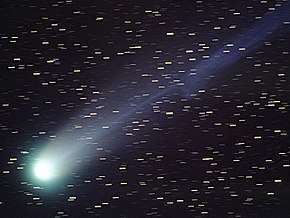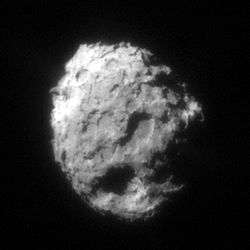273P/Pons–Gambart
273P/Pons–Gambart, also called Comet Pons-Gambart, is a short-period comet first discovered on June 21, 1827 by Jean-Louis Pons and Jean-Félix Adolphe Gambart. It has a 186 year orbit. It fits the classical definition of a Halley-type comet with (20 years < period < 200 years). It was lost and was not recovered until November 7, 2012, when amateur astronomer Rob Matson discovered a comet, and it was identified that the pre-recovery short-arc orbital calculations for Pons-Gambart were completely wrong because the comet only had a 1-month observation arc with poor data.[4]
| Discovery | |
|---|---|
| Discovered by | Jean-Louis Pons, Jean-Félix Adolphe Gambart (first discovery) Rob Matson (second discovery) |
| Discovery date | June 21, 1827 (first discovery) November 7, 2012 (second discovery) |
| Alternative designations | 1110 K1?;[1] C/1827 M1; C/2012 V4 |
| Orbital characteristics A | |
| Epoch | 2014-May-22 (2456799.5) |
| Observation arc | 187 years |
| Aphelion | 64.274 AU |
| Perihelion | 0.81043 AU |
| Semi-major axis | 32.542 AU |
| Eccentricity | 0.97509 |
| Orbital period | 185.6 years |
| Inclination | 136.39 |
| TJupiter | -0.643 |
| Earth MOID | 0.17 AU (25 million km) |
| Last perihelion | December 19, 2012[2] June 8, 1827 |
| Next perihelion | 2191-Aug-17[3] (Horizons) |
The original name when first discovered was C/1827 M1.[5] Before the 2012 return, when Comet Pons–Gambart was speculated to have a roughly 60 year orbit it was suspected of possibly being comet 1110 K1.[1]
Of the numbered periodic comets only 153P/Ikeya-Zhang has a longer orbital period.
See also
- Marseilles Observatory
References
- Hasegawa, Ichiro; Nakano, Syuichi (October 1995). "Periodic Comets Found in Historical Records". Publications of the Astronomical Society of Japan. 47 (5): 699–710. Bibcode:1995PASJ...47..699H.
- MPC
- Horizons output. "Observer Table for Comet 273P/Pons-Gambart" (Soln.date: 2014-May-12). Retrieved February 25, 2019. (Observer Location:@sun)
- Kronk, Gary W. "273P/Pons-Gambart". Retrieved September 6, 2015.
- Seargent, David A. J. (March 15, 2017). Visually Observing Comets. Springer. ISBN 9783319454351.

